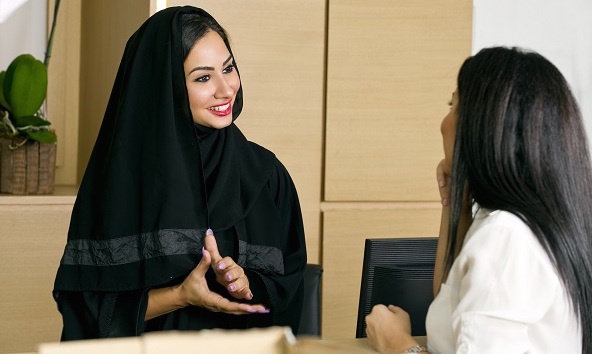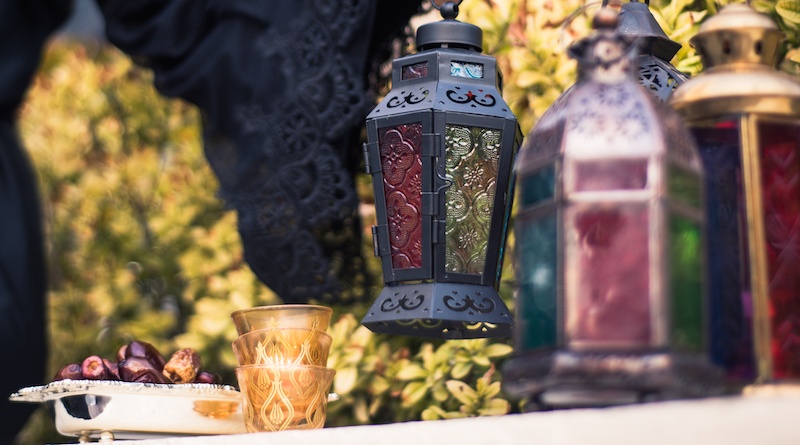Over the past 2 decades, the UAE (Dubai in particular) has become a significant business and leisure destination. From its stunning architecture to its irresistible beaches, the UAE has redefined the art of hospitality in its central geographical location where “east meets west”.
Learn the ins and outs of the Arab culture to make the most of your trip or relocation to this fascinating Middle Eastern hub with our UAE cultural etiquette guide.
Introductions
As-salam alaikum is the customary greeting and means peace be upon you to which the reply is Wa alaikum as-salam – and upon you (be peace).
Inshallah means God willing and is often used as a response upon agreement on future cooperation.
While engaging in building business relationships in the UAE, remember how important social status is. Always use the correct title when addressing someone. It is acceptable to address someone with Sheikh – or Sheikha for a woman, Sayed for Mr., Sayeda for Mrs. It is customary to address strangers by their first names only, e.g. Mrs. Julia
It is crucial to always greet and pay your respects to the senior in the room before greeting everyone else. Handshakes are very common and can last a couple of seconds longer than you are used to. There is an unwritten rule saying that you should wait for your counterpart to withdraw their hand first.
When a man is being introduced to a woman, he should wait to see if she extends her hand towards him first. It is not customary for Muslim women to shake a man’s hand in public settings. When a Western woman is introduced to a Muslim man, she also should respectfully wait for him to make the first move instead of extending her hand first in a greeting.
It is considered improper to inquire about a man’s wife or daughter. It is polite to ask about family or health in general, but not specifically about any females who have a unique status within the family.

Body Language
People in the Middle East talk to each other in a loud and energetic manner, which might be interpreted as anger to a Westerner, but is a common way of communicating in this part of the world.
The so-called ‘personal space’ might be slightly smaller in the Middle East than it is in some Western countries. Try not to move away when a person steps closer as you might unwillingly offend them.
Men should avoid touching and prolonged eye contact with Muslim women at all times. It shows respect for the culture and traditions and your female counterpart – as well as her men companions – will surely acknowledge and appreciate it.
Do not be surprised if your business partner holds your arm while heading somewhere together. This does not have any malicious connotations.

Eating Etiquette
People in the Middle East are famous for their great hospitality. Never refuse a beverage or pastries during a meeting or other times, as they are an important part of every social gathering. You should kindly thank your hosts for their hospitality and compliment the food and drinks you have been served.
Older people enjoy a very special status within society. Always remember to show due respect. It includes standing up when older people enter a room, always greeting older people first, serving older people first at a meal.
Use your right hand for eating, shaking someone’s hand, or handing an object. Like in many different cultures, the left hand is used for bodily hygiene and hence considered unclean.
When invited to visit, a small personal gift is a nice touch and – as long as it is meaningful – absolutely acceptable.

Business Etiquette
Doing business in the Middle East has a lot to do with personal relationships and traditional values, like family, trust, and honor. Therefore it is essential for business relationships to be based on meaningful friendships.
The working week in the Middle East is usually Sunday through Thursday.
Westerners are expected to be punctual and to arrive at scheduled meetings in time. It is probable that your business counterpart will not obey this rule himself though, and be prepared to be patient.
One of the most common mistakes Western businessmen do is sitting in a way that the bottoms of their shoes show, e.g. by placing the ankle of one leg over their other knee in a nonchalant manner. In the Middle East, this is a sign of great disrespect. Also, never touch anyone with your shoe. In case this should unwillingly happen, apologize sincerely.
Delays in meetings are a common occurrence. Always be patient and accept that decisions might take time.
Learning a few words in Arabic can go along way to showing respect to your hosts.

The religion of the UAE
All Gulf countries, including the UAE, Jordan, and Kuwait, are Muslim, as is Egypt. Always keep in mind that insulting or questioning Islam or the prophets is a serious offense, just as it is with any other religion.
Muslims follow the Koran, meaning that the consumption of alcohol, pork, and shellfish is forbidden. It is best not to consume these in the presence of government or religious officials. It is also strictly prohibited to drink alcohol in public.
Muslims pray five times a day. You will likely hear the calls to prayer:
- Between dawn and sunrise
- About 30 minutes after midday
- Afternoon
- Right after sunset
- 1 ½ hour after sunset
When entering a mosque, or someone’s home, always remember to take off your shoes. Women must always cover their hair when entering a mosque or any religious site for that matter.
For more information, check out the UAE Cultural Awareness course.
Andrie Steliou
Latest posts by Andrie Steliou (see all)
- 8 Ways to Help Keep Your Child Focused and Engaged in Online Learning - October 19, 2022
- How to Improve Social Intelligence Skills? - May 10, 2022
- How to Improve Organizational Skills at Workplace? - May 6, 2022

